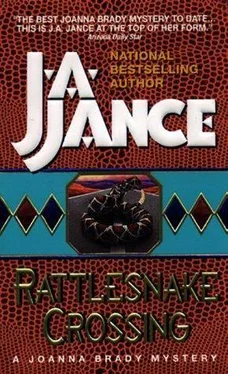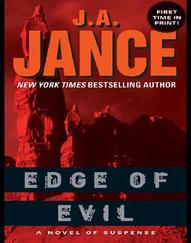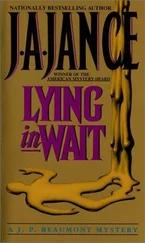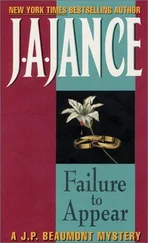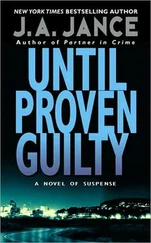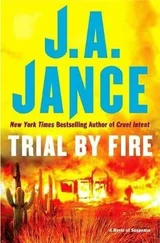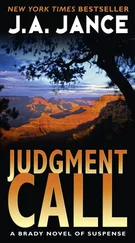J. Jance - Rattlesnake Crossing
Здесь есть возможность читать онлайн «J. Jance - Rattlesnake Crossing» весь текст электронной книги совершенно бесплатно (целиком полную версию без сокращений). В некоторых случаях можно слушать аудио, скачать через торрент в формате fb2 и присутствует краткое содержание. Жанр: Детектив, на английском языке. Описание произведения, (предисловие) а так же отзывы посетителей доступны на портале библиотеки ЛибКат.
- Название:Rattlesnake Crossing
- Автор:
- Жанр:
- Год:неизвестен
- ISBN:нет данных
- Рейтинг книги:5 / 5. Голосов: 1
-
Избранное:Добавить в избранное
- Отзывы:
-
Ваша оценка:
- 100
- 1
- 2
- 3
- 4
- 5
Rattlesnake Crossing: краткое содержание, описание и аннотация
Предлагаем к чтению аннотацию, описание, краткое содержание или предисловие (зависит от того, что написал сам автор книги «Rattlesnake Crossing»). Если вы не нашли необходимую информацию о книге — напишите в комментариях, мы постараемся отыскать её.
Rattlesnake Crossing — читать онлайн бесплатно полную книгу (весь текст) целиком
Ниже представлен текст книги, разбитый по страницам. Система сохранения места последней прочитанной страницы, позволяет с удобством читать онлайн бесплатно книгу «Rattlesnake Crossing», без необходимости каждый раз заново искать на чём Вы остановились. Поставьте закладку, и сможете в любой момент перейти на страницу, на которой закончили чтение.
Интервал:
Закладка:
"Look, God," Joanna Brady said aloud, as if He were right there in the Blazer with her-a concerned civilian, maybe, doing a ride-along. "Surely, if You can make grass grow here, You can figure out a way to save Esther Maculyea-Daniels. Please."
Beyond that, there was nothing Joanna could do but let go and let God.
A few miles later, at the traffic circle in Benson, she turned east off Highway 80 and followed the I-10 frontage road until she reached the turnoff for Pomerene. There, crossing the bridge across the San Pedro, she slowed enough to observe the awesome effect of water in the desert. Over the hum of the Blazer's powerful engine, she could hear the chatter of frogs. And above that, she heard the water.
Since an earthquake in the late 1800's the modern San Pedro usually carried little more than a trickle of mossy water in a wide expanse of dry and sandy riverbed. On that hot August day, however, the rushing tumult below the bridge was running almost bank to bank in a reddish-brown, foam-capped flood. Unfortunately, people accustomed to the river's usually placid guise often failed to give this transformed San Pedro the respect it deserved.
Summer rains had come early and often that year, starting in the middle of June. In the course of the past two months the renewed San Pedro, with its deadly change of personality, had claimed four separate victims. One carload of Sunday-afternoon picnickers had been washed away up near Palominas in the middle of July. That incident alone had resulted in three fatalities. A mother and two preschool children had died, while the father and two older children had been hospitalized. Then, in early August, a seventeen-year-old St. David youth had bet his buddies ten bucks that he could swim across the rain-swollen flood. He had lost both the ten-dollar wager and his life.
Joanna could see why. More than twenty-four hours after the last rain, a torrent of silt-laden water still churned north ward. Seeing it reminded her of the stories she had heard at her father's knee-stories D. H. Lathrop had heard from Cochise County old-timers. They had claimed that before the earthquake, there had once been so much water running in the San Pedro, they could float on rafts from Palominas north all the way to Winkelman, where the San Pedro River met up with the Gila. For years Joanna had privately scoffed at what she regarded as nothing more than tall tales on the order of Paul Bunyan's blue ox, Babe. Now, though, the raging river made those claims seem much more plausible.
Pomerene, a few miles on the other side of the bridge, seemed to have little justification for its continued existence. A few people-several hundred at most-seemed to live in the near vicinity, but for what reason, Joanna couldn't fathom. Some of the houses were fine, but the good ones were interspersed with tumbledown shacks and moldering mobile homes surrounded by rusted-steel shells of wrecked vehicles. The cheerfully sparkling and still brand-new street signs, assigned with ironic artistry by some bureaucrat locked up in the county addressing department, were wildly at odds with the sad reality of their surroundings.
It seemed to Joanna that Pomerene should have been a ghost town-that it should have been allowed to die the natural death of fading back into the sandy river bottom. Instead, it stubbornly persisted, hanging on like some punch-drunk fighter-hurt badly enough to be beyond help, but too far gone to have sense enough to lie down and die.
The down-at-heels hovels on Bella Vista Drive and Rimrock Circle in particular made places in Bisbee's Tin Town neighborhood seem prosperous by comparison. And Clyde Philips' tin-roofed shack at the far end of Rimrock could easily have been thrown together by the same turn-of-the-century carpenters who had built the mining-camp cabins that still clung like empty, dry locust husks to the red-rocked sides of Bisbee's B-Hill.
Climbing up onto the rickety front porch, Joanna knocked firmly on the grime-covered door. Even though she knocked several times, no one answered. Leaving the front door, she went to the side of the house past a dusty, faded blue Ford quarter-ton pickup. At the back door she knocked again-with similar results. No answer.
Trying to decide what to do next, Joanna glanced around. At the end of the driveway, in place of an ordinary garage, was a slump-block building that looked like an armed fortress. Or a jail. Rolls of razor wire lined the tops of the walls. The only windows were narrow slits on either side of a steel door, barred in front by a heavy-duty wrought-iron grille. Approaching the door, Joanna could tell that the slits were covered by one-way glass that allowed whoever was inside the building to see out without offering even a glimpse of what was on the other side of the wall.
Fastened to the grille was a hand-lettered sign that announced, NO TRESPASSING. THESE PREMISES GUARDED BY A LOADED AK-47. GO AHEAD. MAKE MY DAY.
Great, Joanna thought as she stepped forward and punched a doorbell that had been built into the casement of one of the windows. Just what we need. A gun nut with a Clint Eastwood complex.
Pressing the button, she strained to hear whether or not the bell actually worked. Up on the roof, an air-conditioning unit of some kind rumbled away. Over the din of that, it was difficult to tell if the bell did indeed function, but between the grille and the concrete-block construction, knocking on either the door or the wall wasn't an option.
While waiting for someone to answer, Joanna studied her surroundings, expecting to find some kind of electronic monitoring equipment focused on the door. As far as she could see, however, Clyde Philips counted on old-fashioned armory kinds of protection rather than newfangled gadgets. She rang the bell a second time and waited once more. Still no one came to the door. She was about to give up and Walk away when a woman's gravelly voice startled her.
" Clyde 's pro'ly over to Belle's. His truck's here, so he musta walked."
Joanna turned to see a sun-baked old woman standing on the sagging back porch of the house next door. "Where's that?" she asked.
"Belle's?" the old woman asked, and Joanna nodded. “It’s his ex-wife's place. Uptown." The woman pointed vaguely to the left with a gnarled cane. "Over on Old Pomerene Road."
"Will I have any trouble finding it?"
"Hell’s bells," the woman said. "Hardly. It's the only restaurant in town. But you'd better hurry if you want to catch lunch or Clyde, either one. Belle closes her doors at three sharp. After that, people have to go all the way into Benson if they want a bite to eat."
The woman was right. Belle Philips' place on Old Pomerene Road wasn't at all hard to find. Of the dozen or so storefronts on what passed for Main Street, only three still functioned as businesses. One of the three with lights on was the ground floor of a decrepit two-story building that looked as though a strong wind would blow it to smithereens.
At some time in the distant past, someone had gone to the trouble of covering the exterior with cedar shingles. Sun and heat had leached all the natural oils out of the wood, leaving it gray and brittle and almost charred around the edges. On the north and east sides of the building, the shingles, sagged in crooked, weary rows. On the west side of the building-the one that took the brunt of the sun-most of the shakes were missing completely, revealing in their stead a ghostly layer of faded red tarpaper painted to look like bricks.
The rest of the building didn't look much better. In both grimy front windows, chipped gold letters announced "Belle's Donuts and Eatery." Under one sign was a three-by-five card. On the card along with a hand-drawn ballpoint arrow that pointed to the word "Donuts," was the added notation "One hundred thousand two hundred served."
Читать дальшеИнтервал:
Закладка:
Похожие книги на «Rattlesnake Crossing»
Представляем Вашему вниманию похожие книги на «Rattlesnake Crossing» списком для выбора. Мы отобрали схожую по названию и смыслу литературу в надежде предоставить читателям больше вариантов отыскать новые, интересные, ещё непрочитанные произведения.
Обсуждение, отзывы о книге «Rattlesnake Crossing» и просто собственные мнения читателей. Оставьте ваши комментарии, напишите, что Вы думаете о произведении, его смысле или главных героях. Укажите что конкретно понравилось, а что нет, и почему Вы так считаете.
